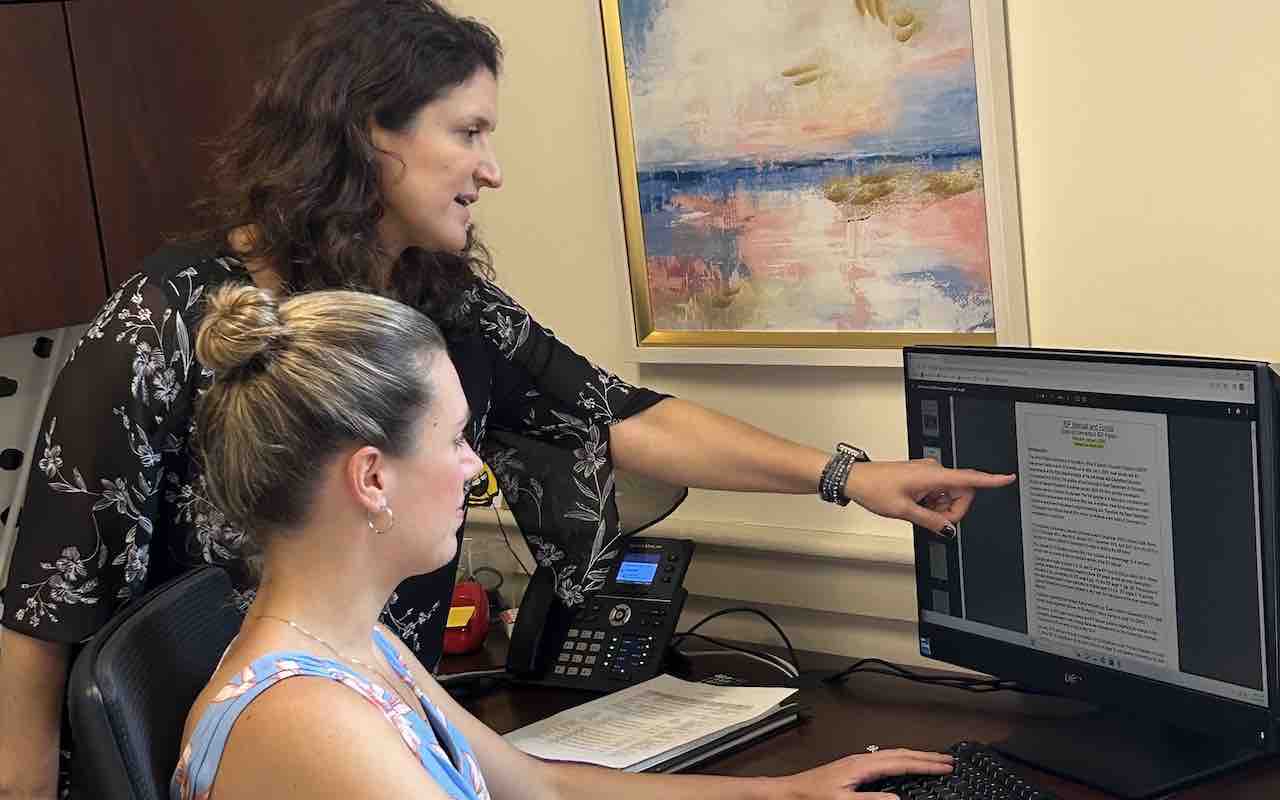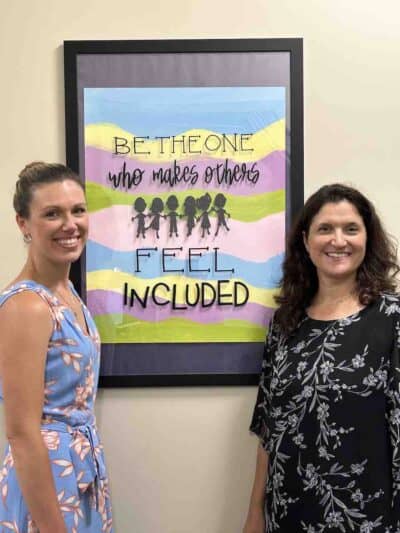Main Street News

Supporting All Students: Gaschel-Clark and Holmes Start their New Positions in Region One
This July, my mom, Rebecca Gaschel-Clark, and her new colleague, Ashley Holmes, began their new administrative roles as Director of Pupil Services and Supervisor of Special Education, respectively, in Region One (CT). I spoke with them to learn more about how they first got into the field of special education, what these careers mean to them and the greater community, and the importance of celebrating Disability Awareness Month.
What initially inspired you to work in education, and more specifically, in special education? Was it a field you’ve always wanted to go into? If not, what influenced your transition into this work?
A: Well, believe it or not, I was adamant that I did not want to be a teacher when I graduated from high school. I wanted to climb the corporate ladder and make millions of dollars! As I earned my bachelor’s degree, I worked full time as a nanny. The family I worked for had twins, a boy and a girl, born prematurely. The little girl developed typically hitting all of her milestones. She was full of energy, always moving, and very determined. The little boy, however, was diagnosed with Cerebral Palsy and had to work hard for everything. He was calm, an observer, and always focused. I worked with birth-to-three providers, helped out at their pediatrician appointments, and celebrated all the little wins along the way. I witnessed and felt the pangs of worry when progress was slow, and his sister seemed to thrive.
As they continued to grow, and their little personalities began to flourish, it became more and more evident that each would find their way in the world. They turned three, joined pre-school, and he got his first Individualized Education Program (IEP). In turn, I got my first office position. I HATED it! It wasn’t rewarding, there was no laughter, no connection, and I had no purpose. After three months, I went back to school for my master’s degree in education and focused on Special Education. The rest is, as they say, history! I will always be grateful for that family because they allowed me to be a part of their journey. A journey that was overwhelming and scary but incredibly beautiful.
R: Like Ashley, I didn’t set out to be an educator. Despite working at summer camps for students with disabilities, babysitting since I was 12, and even volunteering in my elementary school’s special education classroom, it never occurred to me to pursue a career in teaching. After my freshman year at the University of Hartford, I decided that communications wasn’t for me. Thoughts of anchoring newscasts were less exciting to me, and I was at a crossroads. Fortunately, one of my good friends was an education major. She took me to Professor Ed Weinswig’s office for guidance. After hearing about my work and volunteering history, Dr. Weinswig quickly asked why I wasn’t one of his students. From that day forward, I realized that education—especially early childhood and special education—is my passion. I love helping others and making a difference.
 How did you end up in your current administrative position? In other words, what sort of path have you taken career-wise to end up in your present role?
How did you end up in your current administrative position? In other words, what sort of path have you taken career-wise to end up in your present role?
A: I started my career as a special education teacher in North Canaan Elementary School. I had a wonderful mentor teacher, Brigid Somers, and inspiring supervisor, Martha Schwaikert. They ultimately started me down the path of administration. I am the most fulfilled at work when the students I work with are successful and make gains towards their goals. In my work, I constantly found myself pushing for larger systemic changes in order to move students higher. While I loved being in the classroom and working closely with families, I saw a chance to create more opportunities for people with disabilities by becoming an administrator.
R: I have been fortunate enough to work in Region One for Pupil Services for close to 30 years. I began my career working with some of our youngest learners who were working through very challenging behaviors. As those students grew older, my director and mentor, Theresa Terry, decided that Pre-K was a great fit for my skill set and energy; I loved every minute of my 27 years, helping our littlest learners grow and learn. In 2017, I obtained my administrator certificate which provided a multitude of wonderful administrative opportunities for me in Region One thanks to Lisa Carter, Martha Schwaikert, and Stephanie Magyar. After filling many different administrative roles at the building level, I was able to become the Supervisor of Special Education in the fall of 2021. Upon Martha’s retirement, I am fortunate enough to have the opportunity to now fill the role of Director of Pupil Services. In this capacity, I look forward to doing whatever I can to make sure our amazing students in Region One can participate in enriching educational experiences with access to the curriculum regardless of disability.
What sorts of things do you have to do during a typical day at the office?
A: Problem solving, but first…coffee. The first sip is the best, partnered with an affirmation for the day, and then off we go! One of the things I love most about special education is you never know what the day will bring. I try to set a list of priorities and allow myself the flexibility to be available to families, students, or staff if they need me. Our Region One pupil services office is incredibly dedicated, and I know I can count on Jody Pegorari and Nadine Andrews to jump in and help keep our department running like a well-oiled machine. We support each other and trust that we are all working toward the same goal.
R: There is tremendous variety on any given day. Our office truly is fabulous at handling anything that comes our way. We may be working with All Star to provide appropriate transportation to our students, then meeting with the business office to work on budgets and grants. On another day, we might welcome a new family to our community while creating a supportive plan for one of their children, then meet with teachers to go over new research regarding instructional strategies and programs. While we have to be reactive in many situations, we all do our best to be as proactive and positive as possible.
What do you like to do outside of the office?
A: When I’m not at the office, I try to spend as much time with my family as possible. I have a husband, Dylan, and three children Aurora (11), Carter (5), and Harper (3). We also have two dogs! Life is busy but we try to have fun, whether it’s art projects, water balloon fights, or watching the latest superhero movies.
R: I am so fortunate to be blessed with an amazing family and fantastic friends. When I’m out of the office, I love to spend time with them, enjoying the fun activities and destinations in our incredible community. The area offers so many opportunities to enjoy on a daily basis. However, we also love spending time up north in the Adirondacks. We enjoy boating, swimming, and hiking. Most recently, I’ve discovered that kayaking is pretty fabulous, too.
How would you describe your first month in your new position? Are there any challenges you’ve encountered so far that you’d like to discuss?
A: The first month has really been about trying to learn as much as I can about our communities, families, and schools. This region has a rich history and deep connections. My goal is to have a better understanding of how I can best support the students and families I work with while they’re in Region One, but also how we can set them up for lifelong success well after their public education concludes.
R: Fortunately, before her retirement as Director, Martha Schwaikert made sure that I was involved in almost every special education case and/or issue that developed in our region. Even as Supervisor, I was able to expand my skill set so that the transition was not as drastic as it could have been. Both the Pupil Services team and the Central Office of Region One have been incredibly supportive and have ensured a smooth beginning to my tenure as Director. I am greatly appreciative of all the guidance and support of so many!
What is the most rewarding or fulfilling aspect of working in special education/pupil services? What is your favorite part of this career?
A: I love making connections with students and their families. I always want them to feel like they have a support system. Navigating life is challenging and navigating life with a disability can feel even more overwhelming, scary, and isolating. I want my families to feel like they have a partner and they’re not in it alone. I know I won’t always have the answers and I’ve been around long enough to know there’s always something new to learn. My students have always been the best teachers.
R: Having been in this district for so long, I have truly come to love the school community and everyone in it. Working with families year after year, seeing their children grow, learn, and succeed while being able to facilitate resources and support to make the journey even more successful is super exciting! While working in special education can be challenging, especially on the administrative level, the rewards far outweigh any difficulties that one may face.
Would you say the summer program, or any of the other programs and support services you provide, has had a particular impact on the community and its well-being?
A: I believe that our work experience program has probably made the biggest impact on our community as it bridges the work we do here in school with our local businesses. Students are able to apply their skills in the workplace and feel empowered to take on more responsibility. It brings relevance to their education, brings families closer to their communities, and allows businesses to “grow their own.” I am hoping more businesses will look to become involved with our students at Region One.
R: We have been so fortunate to have many teachers continue their good work with students throughout the summer. We love being able to provide fun and educational programming during those busy months. It helps students to keep the connections or build new relationships with teachers and students from around the region. It also enables us to provide tutoring and instruction to those who need it so that they are ready to go when school starts.
Why would you say it’s significant that Disability Pride Month is observed? How can students with learning disabilities or a range of needs be supported both now and year-round?
A: Disability Pride Month serves as a reminder that people of ALL abilities deserve to be celebrated. That being different, imperfect, or atypical is beautiful and valuable. I hope it encourages communities to reflect on how they can make spaces more accessible and inclusive. To create positions which allow individuals to use their strengths, contribute to their communities, and create more opportunity to be involved.
R: Awareness is the first step to creating an environment that is welcoming and inclusive for all students. It is essential for all students to feel happy, comfortable, and supported in the school community. Families, too! Everyone has something to share and offer. We are all different and unique, which makes for a wonderfully diverse community. By enabling students who have disabilities to work and learn alongside those without such challenges, we help to create a welcoming environment where everyone flourishes.
To learn more about this topic and find resources, visit www.understood.org.



